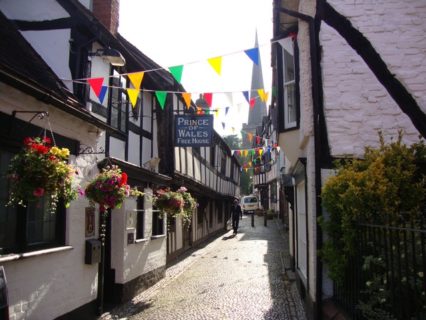Poet Mererid Hopwood talks about Versopolis and her excitement at performing at the Ledbury Poetry Festival.
The motorway from Vienna that heads northwest to Krems may well pass through beautiful towns and countryside. But from the passenger seat of a speeding car you can only guess this, for the wide road, wider than the Danube even, is flanked by enormous walls. The driver explains that these are Lärmschutzmauer– ‘noise protection walls’ – built so that the villages and towns, the farmhouses and fields, the animals and the people who live behind them can carry on undisturbed by the thundering traffic.
I was on my way to the Literatur und Wein festival where I was to take part as one of the Ledbury Poetry Festival-Versopolis poets, a EU funded gathering which mercifully still accepts Brexit-victims. There, I would be very much dependent on the ability of sound, if not noise, to reach minds, if not penetrate walls. In readings where nobody else knows the words, you have to rely to a large extent on the sounds of the syllables to convey meaning.
You also need to have faith in the listening mind of the audience and its willingness to be wide open. For while listening is always an active engagement, listening to poems in a language you don’t understand demands even more participation.
 Of course, in the world of Versopolis, the readers of poems from distant languages are never entirely alone with bothing but the sound patterns of their poems. They have translations. But the work of the translator is not entirely without its challenges either. Imagine a musician in front of an audience. She has a voice but no song, and is without instruments to hand. Standing there, she reads out a stream of letters as clearly as she can. These perhaps: “D E Fsharp A, E, D Fsharp E DE Fsharp A EFsharp D”. The audience, who recognises the letters, seems to sort-of-follow, though it’s obvious to all involved, that something’s missing.
Of course, in the world of Versopolis, the readers of poems from distant languages are never entirely alone with bothing but the sound patterns of their poems. They have translations. But the work of the translator is not entirely without its challenges either. Imagine a musician in front of an audience. She has a voice but no song, and is without instruments to hand. Standing there, she reads out a stream of letters as clearly as she can. These perhaps: “D E Fsharp A, E, D Fsharp E DE Fsharp A EFsharp D”. The audience, who recognises the letters, seems to sort-of-follow, though it’s obvious to all involved, that something’s missing.
The letters in our example represent the notes of the Welsh lullaby, Suo Gân, (and if you’re struggling to transpose letters to notes and notes to tunes in your head, think of the beginning of the film, Emperor of the Sun, where ‘Jim’ holds his salute long and solemnly behind barbed wire; that’s what he’s singing: Suo Gân). The string of letters above is a correct – but coded – representation of this music. They don’t however resonate with the same melody.
What’s magical about the wonderful world of Versopolis is that it creates a space where the poet, the translator and the audience can join in live, three-way collaboration. This enables the sound and the sense to come together more or less simultaneously. And this makes up for the lack of having just the one without the other, as is so often the case when you read poetry in translation. For the experiment to work best, the listeners of the translated lines must allow themselves to be persuaded to take the outline of the picture that is drawn on their mind by the words they understand, and let the unfamiliar words, the sounds that come from the reading of the original, colour them in.
Interestingly, and as an aside, one way to gauge the substance of your own work is to run it through a quick translation check. It’s not an entirely satisfactory test of course. It’s a bit like trying to gauge the quality of a car by considering the body without the engine, or the quality of a coat by feeling the fabric without testing the cut. But it has some merit. Stripped bare of the harmonies that you can hardly avoid hearing as the words in the original lines chime against one another, in translation you are left with just the picture, the image, for even when the original verse has lost all its musicality on the journey from language A to language B, it usually manages to hang on to its imagery.
In Ledbury this year, there will be another opportunity to venture in threesomes on language journeys. Poets, translators and audiences will come together to listen out across languages. And Ledbury is well-placed to stage such adventures, given that it’s quite probable that its very name holds components of two neighbouring tongues: ‘bury’ from the old English ‘burg’, meaning fortified site, and ‘led’, from ‘lydan’, a Welsh word meaning ‘broad’ and referring here to the River Leadon. The plausibility of this explanation is strengthened when we consider Ledbury’s location on the strip between two countries and see the patterns in nearby place names. Malvern, for example, is a similarly interesting combination; here both components ‘mal’ and ‘vern’ stem from the Welsh ‘moel’ and ‘fryn’, literally translated as ‘bald hill’, but the words have long since come together, moulded in an English mouth to become a very English name.
Whatever the linguistic combinations, I very much look forward to meeting fellow travellers on multi-lingual journeys on the 8thof July.
Gobeithio y cawn eich cwmni.
Mererid Hopwood performs at the grand finale of Ledbury Poetry Festival 2018 , Versopolis Readings on Sunday 8 July alongside Kateryna Kalytko (Ukraine), Tomica Bajsic (Croatia), Michal Sobol (Poland), Lou Raoul (France/Brittany) and fellow UK Versopolis poets for 2018 Sasha Dugdaleand Sandeep Parmar. Tickets and full details here https://www.poetry-festival.co.uk/events/2018-85/












